

Energy harvesting. Energy harvesting (also known as power harvesting or energy scavenging) is the process by which energy is derived from external sources (e.g. solar power, thermal energy, wind energy, salinity gradients, and kinetic energy), captured, and stored for small, wireless autonomous devices, like those used in wearable electronics and wireless sensor networks.
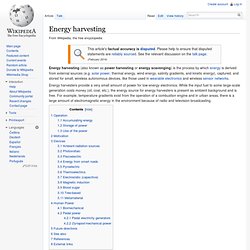
Energy harvesters provide a very small amount of power for low-energy electronics. While the input fuel to some large-scale generation costs money (oil, coal, etc.), the energy source for energy harvesters is present as ambient background and is free. MDIF. Mission MDIF invests in independent media around the world providing the news, information and debate that people need to build free, thriving societies.
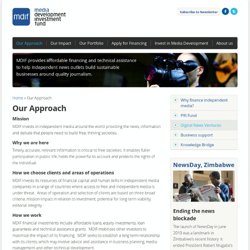
Why we are here Timely, accurate, relevant information is critical to free societies. It enables fuller participation in public life, holds the powerful to account and protects the rights of the individual. How we choose clients and areas of operations MDIF invests its resources of financial capital and human skills in independent media companies in a range of countries where access to free and independent media is under threat. Unreasonable Institute.
Broken windows theory. The broken windows theory is a criminological theory of the norm-setting and signalling effect of urban disorder and vandalism on additional crime and anti-social behavior.
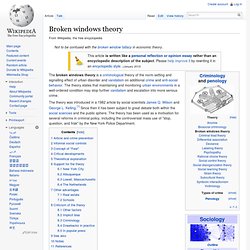
The theory states that maintaining and monitoring urban environments in a well-ordered condition may stop further vandalism and escalation into more serious crime. The theory was introduced in a 1982 article by social scientists James Q. Wilson and George L. Kelling. Since then it has been subject to great debate both within the social sciences and the public sphere. Article and crime prevention[edit] The broken windows theory was first introduced by social scientists James Q. Think tanks. A think tank (also called a policy institute) is an organization, institute, corporation, or group that conducts research and engages in advocacy in public policy.[1] Many think tanks are non-profit organizations, which some countries such as the United States and Canada provide with tax exempt status.
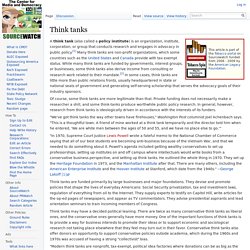
While many think tanks are funded by governments, interest groups, or businesses, some think tanks also derive income from consulting or research work related to their mandate.[2] In some cases, think tanks are little more than public relations fronts, usually headquartered in state or national seats of government and generating self-serving scholarship that serves the advocacy goals of their industry sponsors. Of course, some think tanks are more legitimate than that. Private funding does not necessarily make a researcher a shill, and some think-tanks produce worthwhile public policy research. Think tanks are funded primarily by large businesses and major foundations.
US Government Books. NIRA's World Directory of Think Tanks 2005: Introduction. Shy U.S. Intellectual Created Playbook Used in a Revolution. But for the world’s despots, his ideas can be fatal. Few Americans have heard of Mr. Sharp. But for decades, his practical writings on nonviolent revolution — most notably “From Dictatorship to Democracy,” a 93-page guide to toppling autocrats, available for download in 24 languages — have inspired dissidents around the world, including in Burma, Bosnia, Estonia and Zimbabwe, and now Tunisia and Egypt. When Egypt’s April 6 Youth Movement was struggling to recover from a failed effort in 2005, its leaders tossed around “crazy ideas” about bringing down the government, said Ahmed Maher, a leading strategist.
They stumbled on Mr. When the nonpartisan International Center on Nonviolent Conflict, which trains democracy activists, slipped into Cairo several years ago to conduct a workshop, among the papers it distributed was Mr. Peter Ackerman, a onetime student of Mr. Felix Salmon. Steam Punk Remakes Power Grid With Compressed Air. D anielle Fong was 12 years old when her mother decided she should go to college.
Danielle’s teachers didn’t agree. Though an aptitude test put her above 99 percent of students who had already graduated from high school, her teachers said the move to college would ruin her education. But her mother sent her anyway. “Why would I conceivably put my child through six more years of that bullshit?” Remembers Danielle’s mother, Trudy Fong, who was 15 when she herself went to college. Little more than a decade later — after graduating from Canada’s Dalhousie University and then dropping out of the Ph.D. program at the Princeton plasma physics lab when she decided academic research was as broken as grade school — Danielle Fong is the chief scientist and co-founder of a company called LightSail Energy .
In 2010, Danielle Fong and LightSail took their compressed air storage idea to the U.S. THOMAS (Library of Congress) Brookings Institution Topics Page. Latest news from USA TODAY From the Web North Korea could inflict significant damage in attack North Korea has long-range missiles capable of reaching targets in Japan and U.S. bases in Guam, Okinawa and the Japanese mainland.
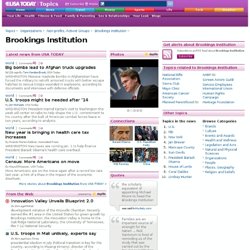
(Photo: KCNA via AP) Recent rhetoric is worrisome when coupled with the North's recent provocative actionsNorth Korean forc More women should run for local offices 3h 6m ago The St. What do these women have in common? Demographics push US toward immigration reform With Congress on recess for spring break, US President Barack Obama has pushed the House and Senate to finish the job of drafting comprehensive immigration reform by April, calling on both political parties to capitalize on recent bipartisan progress tow Veterans fight changes to disability payments (AP Photo/Robert F.
Brookings Institution More stories from USA TODAY Big bombs lead to Afghan truck upgrades U.S. troops might be needed after '14. Center for the American University at the Manhattan Institute. The CAU's web magazine, Minding the Campus (MTC), includes daily commentaries, original essays, and a blog.
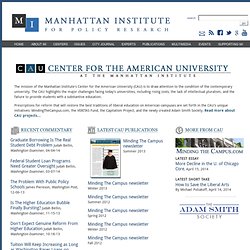
MTC draws upon the best from established magazines and publications, as well as from professional journals, blogs, and student publications. It provides transcripts and videos of CAU events; podcasts and book reviews; and "must reads"—an archive of key documents, research, books, and articles on campus issues. Minding the Campus actively fosters a free exchange of views—one of fair and balanced discussions instead of polemical monologues. The magazine is edited by John Leo, former U.S. News and World Report columnist and current CAU senior fellow. Federation of American Scientists. Welcome. 60-Second Adventures in Thought. Semeiotica. You’ve probably underestimated just how big this is. I met a team at a mobile dev shop a couple of weeks ago and in the discussion I casually mentioned that mobile app usage exceeds web usage.
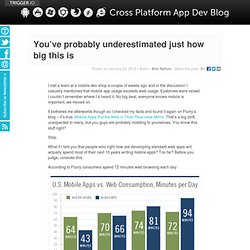
Eyebrows were raised. I couldn’t remember where I’d heard it. No big deal, everyone knows mobile is important, we moved on. It bothered me afterwards though so I checked my facts and found it again on Flurry’s blog – it’s true, Mobile Apps Put the Web in Their Rear-view Mirror. Why Are American Kids So Spoiled? In 2004, Carolina Izquierdo, an anthropologist at the University of California, Los Angeles, spent several months with the Matsigenka, a tribe of about twelve thousand people who live in the Peruvian Amazon.
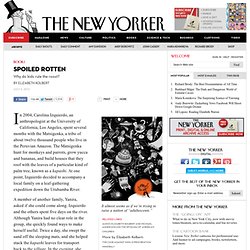
The Matsigenka hunt for monkeys and parrots, grow yucca and bananas, and build houses that they roof with the leaves of a particular kind of palm tree, known as a kapashi. At one point, Izquierdo decided to accompany a local family on a leaf-gathering expedition down the Urubamba River. How can we equip young people with the skills, information and opportunities to succeed in the world of work? - Inspiration. Agriculture 21: Home. Save and grow: 1. The challenge. To feed a growing world population, we have no option but to intensify crop production.
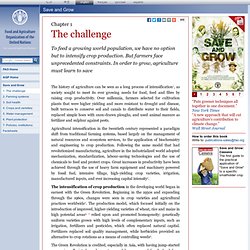
But farmers face unprecedented constraints. In order to grow, agriculture must learn to save The history of agriculture can be seen as a long process of intensification1, as society sought to meet its ever growing needs for food, feed and fibre by raising crop productivity. Over millennia, farmers selected for cultivation plants that were higher yielding and more resistant to drought and disease, built terraces to conserve soil and canals to distribute water to their fields, replaced simple hoes with oxen-drawn ploughs, and used animal manure as fertilizer and sulphur against pests.
Agricultural intensification in the twentieth century represented a paradigm shift from traditional farming systems, based largely on the management of natural resources and ecosystem services, to the application of biochemistry and engineering to crop production. Fertilizer consumption Cereal production Cereal yield. Corporate Document Repository. Science and Engineering Indicators 2012.